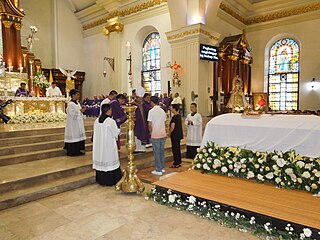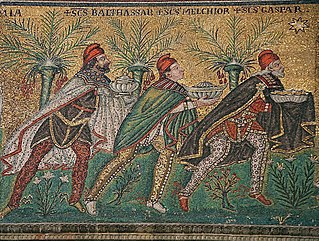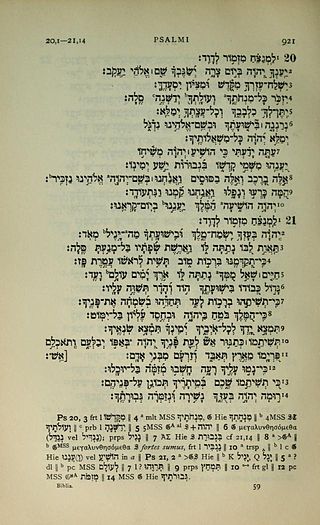Tarshish occurs in the Hebrew Bible with several uncertain meanings, most frequently as a place far across the sea from Phoenicia and the Land of Israel. Tarshish was said to have exported vast quantities of important metals to Phoenicia and Israel. The same place name occurs in the Akkadian inscriptions of the Neo-Assyrian emperor Esarhaddon and also on the Phoenician inscription of the Nora Stone in Sardinia; its precise location was never commonly known, and was eventually lost in antiquity. Legends grew up around it over time, so its identity has been the subject of scholarly research and commentary for more than two thousand years.

A Requiem or Requiem Mass, also known as Mass for the dead or Mass of the dead, is a Mass of the Catholic Church offered for the repose of the soul or souls of one or more deceased persons, using a particular form of the Roman Missal. It is usually celebrated in the context of a funeral.

In Christianity, the Biblical Magi, also known as the Three Wise Men, Three Kings, and Three Magi, are distinguished foreigners who visit Jesus after his birth, bearing gifts of gold, frankincense, and myrrh in homage to him. They are commemorated on the feast day of Epiphany—sometimes called "Three Kings Day"—and commonly appear in the nativity celebrations of Christmas.

The O Antiphons are antiphons used at Vespers during the Magnificat on the last seven days of Advent in Western Christian traditions. They likely date to sixth-century Italy, when Boethius refers to the text in The Consolation of Philosophy. They subsequently became one of the key musical features of the days leading up to Christmas.

The Introit is part of the opening of the liturgical celebration of the Eucharist for many Christian denominations. In its most complete version, it consists of an antiphon, psalm verse and Gloria Patri, which are spoken or sung at the beginning of the celebration. It is part of the proper of the liturgy: that is, the part that changes over the liturgical year.

Joseph Leopold Eybler was an Austrian composer and contemporary of Wolfgang Amadeus Mozart.
Robert White probably born in Holborn, a district of London, was an English composer whose liturgical music to Latin texts is considered particularly fine. His surviving works include a setting of verses from Lamentations, and instrumental music for viols.
The Communion is a refrain sung with psalm recitation during the distribution of the Eucharist in the Divine Liturgy or Mass. As chant it was connected with the ritual act of Christian communion.

Psalm 92 is the 92nd psalm of the Book of Psalms, beginning in English in the King James Version: "It is a good thing to give thanks unto the LORD". In the slightly different numbering system used in the Greek Septuagint and Latin Vulgate translations of the Bible, this psalm is Psalm 91. In Latin, it is known as "Bonum est confiteri Domino ". The psalm is known as Mizmor Shir L'yom HaShabbat, is ostensibly dedicated to the Shabbat day.

Psalm 149 is the 149th psalm of the Book of Psalms, a hymn as the book's penultimate piece. The first verse of the psalm calls to praise in singing, in English in the King James Version: "Sing a new song unto the Lord". Similar to Psalm 96 and Psalm 98, Psalm 149 calls to praise God in music and dance, because he has chosen his people and helped them to victory. Psalm 149 is also marked by its martial tone: it calls on the people to be ready to fight.

Psalm 93 is the 93rd psalm of the Book of Psalms, beginning in English in the King James Version: "The LORD reigneth, he is clothed with majesty". The Latin wording is Dominus regnavit, decorem indutus est. The Book of Psalms is part of the Hebrew Bible and the Christian Old Testament. In the slightly different numbering system of the Greek Septuagint and Latin Vulgate versions of the Bible, this psalm is Psalm 92. It is the first of a series of psalms which are called royal psalms as they praise God as King.

Psalm 21 is the 21st psalm of the Book of Psalms, beginning in English in the King James Version: "The king shall joy in thy strength". The Book of Psalms is part of the third section of the Hebrew Bible, and a book of the Christian Old Testament. In the slightly different numbering system used in the Greek Septuagint and Latin Vulgate translations of the Bible, this psalm is Psalm 20. In Latin, it is known by the incipit, "Domine in virtute tua". The psalm is attributed to David.

Psalm 138 is the 138th psalm of the Book of Psalms, beginning in English in the King James Version: "I will praise thee with my whole heart". In Latin, it is known as "Confitebor tibi Domine in toto corde meo". The psalm is a hymn psalm.

Psalm 124 is the 124th psalm of the Book of Psalms, beginning in the English of the King James Version: "If it had not been the LORD who was on our side, now may Israel say". The Book of Psalms is part of the third section of the Hebrew Bible, and a book of the Christian Old Testament. In the slightly different numbering system used in the Greek Septuagint and the Latin Vulgate, this psalm is Psalm 123. In Latin it is known as "Nisi quia Dominus". It is one of fifteen psalms that begin with the words "A song of ascents". Using "conventional metaphors", it recalls the dangers faced by Israel from which the nation has been rescued.

Psalm 72 is the 72nd psalm of the Book of Psalms, beginning in English in the King James Version: "Give the king thy judgments, O God, and thy righteousness unto the king's son". In the slightly different numbering system used in the Greek Septuagint and Latin Vulgate translations of the Bible, this psalm is Psalm 71. In Latin, it is known as "Deus iudicium tuum regi da". Traditionally seen as being written by King Solomon, its heading may be translated 'to or for Solomon'.

Psalm 96 is the 96th psalm of the Book of Psalms, a hymn. The first verse of the psalm calls to praise in singing, in English in the King James Version: "O sing a new song unto the Lord". Similar to Psalm 98 and Psalm 149, the psalm calls to praise God in music and dance, because he has chosen his people and helped them to victory. It is one of the royal psalms praising God as the King of His people.

Psalm 102 is the 102nd psalm of the Book of Psalms, beginning in English in the King James Version: "Hear my prayer, O LORD, and let my cry come unto thee." In Latin, it is known as "Domine exaudi orationem meam".

Psalm 112 is the 112th psalm of the Book of Psalms, beginning in English in the King James Version: "Praise ye the LORD. Blessed is the man that feareth the LORD". In the slightly different numbering system used in the Greek Septuagint and Latin Vulgate translations of the Bible, this psalm is Psalm 111. In Latin, it is known as Beatus vir qui timet Dominum. It is a psalm "in praise of the virtuous". This psalm, along with Psalm 111, is acrostic by phrase, that is, each 7-9 syllable phrase begins with a letter of the Hebrew alphabet in order.

Da pacem Domine is the incipit of two different Latin chant texts: a votive antiphon and an introit. Both have been the base for musical compositions to be used inside or outside the liturgy. Paraphrased versions of the text were created by Martin Luther in German in 1529, "Verleih uns Frieden", also set by several composers. In English, the first of these texts entered the Book of Common Prayer as one of the preces at Morning and Evening Prayer (Evensong).

Prayer bead with the Adoration of the Magi and the Crucifixion is a small south Netherlandish prayer nut, carved in fine-grained boxwood, dated c. 1500–1510. It is now in the collection of The Cloisters, New York. Originally the bead would have been part of a complete rosary set, and its size suggests its use as an Ave bead, where the supplicant would recite the "Hail Mary". Objects of this type were in great demand in the early sixteenth century. Apart from use in private veneration, they could be worn as necklaces or hung from belts as fashionable accessories. The exceptional craftsmanship of this example indicates that it was intended for a member of the high nobility. J. P. Morgan donated the bead to the Metropolitan Museum of Art in 1917.
















